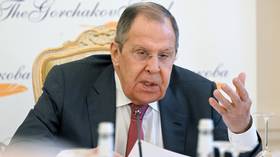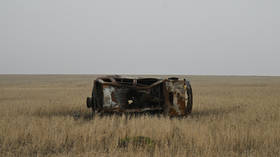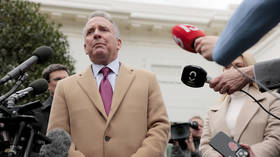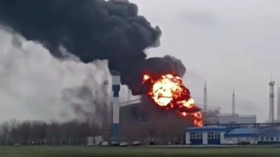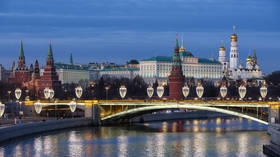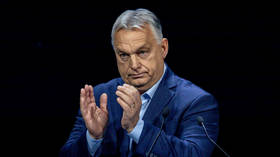As they do their political masters’ bidding, Western journalists can’t comprehend why Chinese people increasingly dislike them
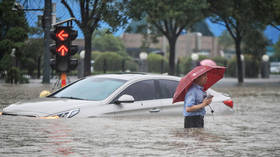
BBC reporters say they were ‘attacked’ in a ‘state-backed campaign’ while covering floods in China. Can’t they see the backlash is from ordinary Chinese fed up with the way Western outlets misrepresent their country?
As floods raged in the Chinese city of Zhengzhou last week, killing up to 300 and uprooting the lives of many more, foreign reporters in the city complained that they were on the receiving end of hostile responses, abuse and intimidation from local people. Following a confrontation with an angry mob, the BBC press team later put out an official statement claiming “journalists were under attack,” which escalated into widespread claims across social media that the resentment vented towards them was no more than a “state backed campaign” against them.
The US Department of State quickly jumped on the bandwagon to claim that China was again undermining freedom of the press and “turning public opinion” negative towards journalists. This is ironic in itself. In no circumstances was the argument considered that the people of China could have genuine grievances against journalists who cover their country, or that they could legitimately disagree with anything that is reported. Instead, it was simply the binary dictum which many journalists identify with: that they are righteous and infallible bringers of truth and that nobody can authentically question their intentions or work, not least Chinese people.
In reality, this is a patronizing, condescending and harrowing dismissal of Chinese public opinion itself, which is frequently dismissed as invalid and inauthentic because it does not align with the ideological viewpoints of foreign media, and insultingly dismisses the fact that people in China know more about the outside world than they are given credit for.
It also ignores that most Chinese know that Western coverage of their country shifts in line with foreign policy priorities, and has become increasingly negative and vilifying. Subsequently, distrust in the Western mainstream media and their intentions has surged. What we are seeing here is a social reaction to this, and it goes without saying that the Western media has repeatedly shown itself to be a bad faith actor when it comes to manufacturing and manipulating stories to fit the foreign policy goals of Washington or London or Brussels. What is happening in China is not about “freedom of the press”- it’s about people being fed up with biased and untrustworthy reporting.
Also on rt.com A US-Sino nuclear arms race is already underway – and we know who the winner will beThe journalist mindset is wrapped in the very ideological and ontological assumptions which drive Western political thought as a whole, a belief that they possess an objective, infallible and authentic definition of “political truth,” of which they claim to hold completely independent of material and political interests, and that they have a self-righteous mission to deliver that truth to others.
It goes without saying that mainstream journalists tend to be incredibly self-righteous as a general rule, not least when it comes to China, where they are convinced that they exist on a higher plateau of enlightenment; that they own the only correct “interpretation” of the country, and its own people do not, and that they must fight to transform the citizens to their ideological vision. The “story” of China presented is not so much what China is, but the story of what the West thinks it ought to be.
When approached with conflicting views from Chinese people, who are growing tired of the negative and narrative-driven reporting against their country, the journalists dismiss these people who question this Western “truth” as inauthentic actors, brainwashed and merely the instruments of a malign state who do not hold a legitimate worldview: “How dare they get angry against the perception of China as a dystopian, authoritarian nightmare or for repeatedly peddling the line of the US state department?”
The inherent contradiction in this mindset is that many journalists are seldom honest that their reporting and editorial lines are essentially a form of crusading or propagandizing, often pushing, either directly or indirectly, a political agenda on behalf of others, which is what they always accuse China of doing. Either way, there is the obvious pattern that ideology and narrative always come before empirical facts, and facts that contradict these things are subsequently dismissed or downplayed.
Also on rt.com The gold medal for anti-Beijing hysteria goes to the NYT for its unhinged attack on China’s Olympic successThe BBC is particularly notorious for this. It describes itself as the “world’s most trusted” international broadcaster and claims absolute impartiality, despite the fact it has long fused its reporting with an ideological value mission and follows the instructions of the British Foreign Office. When it encounters scrutiny, of which it has increasingly found in China since the mood soured, it reverts to a persecution complex and claims it is being silenced by a hostile authoritarian state who does not accept their exclusively owned conception of “truth.”
In reality, the BBC itself is increasingly promulgating hostility against China. Its agenda over the Hong Kong and Xinjiang issues, in particular, has been absolutely relentless. It is no surprise that this aggravates public sentiment in China, which the BBC also enjoys discarding as “nationalism,” but the key message and assumption peddled is that legitimate criticism of its reporting cannot possibly exist.
The idea that such outlets can pretend that their reporting is independent of the geopolitical tensions they are actively helping push at the behest of their political masters is simply naive at best, and dishonest at worst. China is still somewhat more lenient towards foreign media than many other countries, yet this space is narrowing not because “China is growing more authoritarian,” but because the atmosphere of insecurity and distrust is rising, and subsequently it becomes a vicious circle.
If the Western mainstream media could be more honest, fair and impartial in its reporting concerning China, it would not be in this situation, but instead, it is simply denying that its agendas exist and dismissing all criticism of its work as state-led misinformation. It’s not helping its cause. The media has a growing trust problem in China, and it simply can’t or won’t understand why.
The statements, views and opinions expressed in this column are solely those of the author and do not necessarily represent those of RT.






